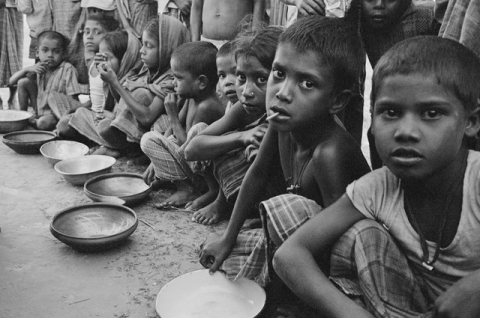Prevalence of Child Malnutrition in Nigerian Worries Stakeholders
Featured Contributors/Columnists, Latest Headlines, News Friday, May 8th, 2015
By Eric Ojo, Abuja – The spate of malnutrition amongst children in Nigeria, Africa’s most populous nation, has remained a source of worry to stakeholders in the health sector of the Nigerian economy in recent times.
Due to its grave implications for the mental, physical, growth and development of children, malnutrition which manifests in some children as kwashiorkor has been in the front burner of public health discourse in Nigeria over the years.
In addition, a good number of health experts, local and international non-governmental and inter-governmental organizations, especially those with child welfare mandate, acknowledge that the health status of every child is inextricably dependent on the amount of nutrition available to him or her at infancy.
In a similar vein, fears have also been raised over the likely overriding impact of malnutrition on the attainment of Millennium Development Goals (MDGs). Moreover, the myriad of childhood killer diseases in addition to prevalent malnutrition accounts for why infant mortality in Nigeria ranks amongst the highest in the world.
According to the United Nations Children’s Fund (UNICEF), about 11 million Nigerian children are presently suffering from malnutrition and the World Health Organization (WHO) also affirms that 35 per cent of deaths amongst Nigerian children under the age of five are caused by malnutrition,
Consequently, 41 per cent of Nigerian children under age five suffer stunted growth as a result of
malnutrition and also increase death rate among children in that age bracket, a report released in July 2013 by the Federal Ministry of Health also revealed.
Worse still, 29.5 percent of children in Nigeria, according to the 2014 Report by the Global Alliance for Improved Nutrition (GAIN) suffer vitamin, a deficiency that causes childhood blindness while half of women of child-bearing age are anemic.
Another survey conducted by the ministry across all the states in Nigeria, equally indicates that malnutrition, a condition which result from insufficiency and imbalance in the intake of nutrients, is wide spread among children, particularly in all Northern states, amounting to about 80 per cent of the child population.
Reacting to this trend, the Borno State Governor, Alhaji Kashim Shettima said his administration continues to be worried about the high rate of malnutrition and poverty, adding that the state introduced feeding system in its schools to ensure each student had access to quality food. He noted that government spends N20 million monthly on the school feeding scheme.
Aside from wide spread poverty, neglect of agriculture and the over-dependence on the oil sector in Nigeria, the on-going insurgency and terrorism unleashed by the dare-devil Boko Haram militia in the North East region of the country has further aggravated the level of malnutrition that part of Nigeria.
For instance, over 60,000 farmers with more than 30,000 acres of rice farmlands are estimated to have abandoned their farms in that region and seek refuge elsewhere without any means of livelihood to cater for their families since the attacks started in 2009.
Against this backdrop, there has been a clarion call on the government and other key players in the health sector to frontally address the problem of malnutrition in the country with a view to finding lasting solution to it.
Stakeholders in the health sector have repeatedly harped on the need for government at all levels to prioritize malnutrition by embarking on a massive sensitization and awareness creation campaign on its dangers and how to redressing it.
In her appraisal of the situation, Jean Gough, a representative of UNICEF in Nigeria, opined that poverty and ignorance were mostly responsible for malnutrition in most Africa countries including Nigeria.
She however, assured that UNICEF was ready to provide information on nutrition of children to women since the fund provides humanitarian and development assistance to children and mothers in developing nations.
“We will provide information to women on nutrition because we found out that lack of information was responsible for the increase in the cases of malnutrition. We are also establishing office in Borno State to care for the state and northeast because we’ve observed the distance in our present office in Bauchi State is not helping matters”, she added.
At the policy level, there are also agitations for the actualization and operationalization of the National Nutrition Council which was approved by the Federal Executive Council since 2007. The delay in setting up the proposed council, according to the Nutrition Society of Nigeria (NSN) is apparently detrimental and counter-productive.
Similarly, there are growing demands for increased budgetary provisions, improved synergy amongst stakeholders in the health sector as well as exploring other possibilities such as the establishment of public-private initiatives targeted at ensuring better nutrition for malnourished children in Nigeria.
Meanwhile, other basic remedial measures such as exploring cheaper sources of protein available, child spacing and breast feeding in line with the recommendations of the WHO, are equally been proffered as a panacea for reducing malnutrition in the country.
Experts say breast milk contains enzymes, antibodies, long-chain fatty acids and hormones and the WHO advises nursing mothers to give their babies exclusive breast feeding for the first six months of life and supplementary breastfeeding for additional 24 months in order to keep them healthy and gain natural immunity against child malnutrition and its debilitating consequences.
Related Posts
Short URL: https://www.africanexaminer.com/?p=23462






















